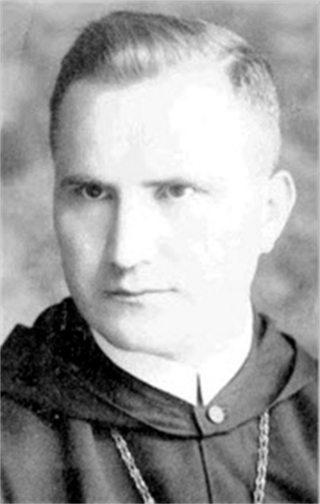Corbinian (Alexander) Hofmeister OSB

Personalia
Order Name:
Born:
Died:
Profession:
Persecution:
Gestapo detention Easter 1943 - 19.04.1944,
Dachau concentration camp 19.04.1944 - 05.04.1945
KZ Number:
Memberships
Curriculum Vitae
Born in Bohemia, Alexander Hofmeister was placed in the care of his sister at the age of seven after the early death of his parents. He first moved to Tittling, then to Landshut and finally to Dingolfing. There he attended grammar school and - on the advice of his home priest - transferred to the boys' seminary at the Benedictine Abbey of Metten in Lower Bavaria. After graduating from high school, he joined the Benedictine Order (OSB) in 1910 and was given the religious name Corbinian at his first profession on November 16, 1911. He initially studied philosophy and theology as part of the monastery's home study program before transferring to the University of Innsbruck and completing his studies at the Theological College in Eichstätt.
At the beginning of the First World War, he was ordained a priest in Metten in 1914. He then studied philology (English and French) at the Ludwig Maximilian University in Munich, which he completed in 1919. After an extended period of study between 1924 and 1926 at the Benedictine Abbey of St. Vincent in Latrobe (Pennsylvania/USA), Belmont Abbey (North Carolina/USA) and Downside Abbey in England, he returned to the monastery school in Metten in 1927 as a teacher of new languages. He was elected abbot there in 1929.
He was skeptical or even opposed to National Socialism from the outset. On March 31, 1939, during his term of office, he was forced by the National Socialist authorities to close the "Alma Mater Metamensis" grammar school, which was over a hundred years old, as well as the monastery and seminary. At the Benedictine abbey in Ettal, there were more and more meetings with people from the resistance during this time.
Crobinian Hofmeister was arrested by the Gestapo at Easter 1943 and initially imprisoned in the Berlin police prison because of his involvement in the resistance group led by the Protestant theologian Dietrich Bonhöfer, Johannes Neuhäusler (later Auxiliary Bishop of Munich) and Admiral Wilhelm Canaris. He was then transferred to Dachau concentration camp from April 1944 to April 1945, where he was placed in cell 35 as a "special prisoner" in the concentration camp's commandant's prison. Here he also met the Protestant pastor Martin Niemöller (cell 30) and Johannes Neuhäusler (cell 32).
After the war, in 1946 Abbot Corbinian took in the displaced and homeless German Benedictines from the Bohemian Braunau Abbey in Metten, who were later given the former Augustinian canons' monastery in Rohr in Lower Bavaria as their new home.
Places
Persecution:
Citations
- Krause, Peter/Reinelt, Herbert/Schmitt, Helmut (2020): Farbe tragen, Farbe bekennen. Katholische Korporierte in Widerstand und Verfolgung. Teil 2. Kuhl, Manfred (ÖVfStG, Wien), p. 129/130.
